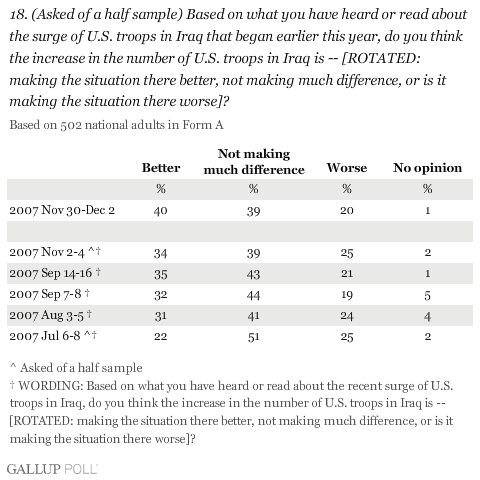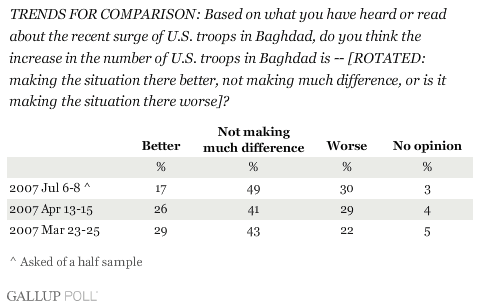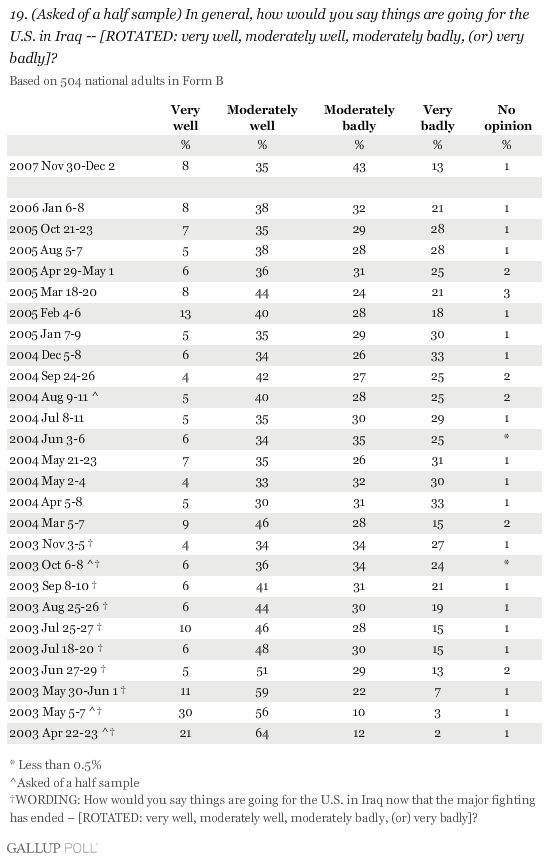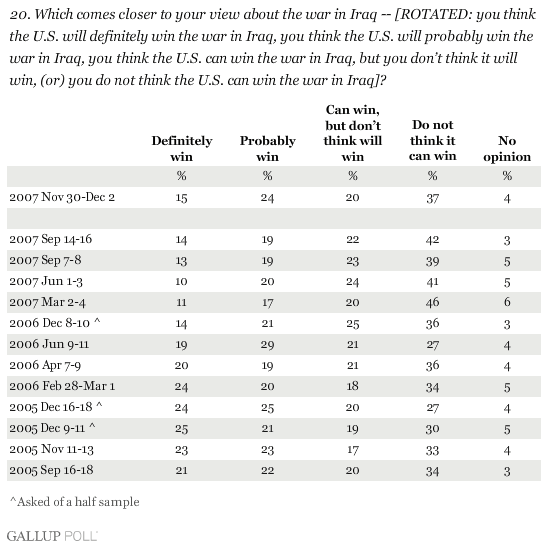PRINCETON, NJ -- Public views of the U.S. troop surge in Iraq have improved over the past month, and Americans' outlook about winning the war is brighter than it was in September. At the same time, even this expanded number of Americans holding upbeat views about the troop surge and the war's progress remain in the minority. And none of this seems to have influenced Americans' more fundamental reaction to the war: The percentage saying it was a mistake to send U.S. troops to Iraq in the first place remains virtually unchanged, at 57%.
The new USA Today/Gallup poll issuing these findings was conducted this past Friday through Sunday, Nov. 30 through Dec. 2, 2007.
The Surge Effect
Four in 10 Americans now say the U.S. troop surge in Iraq that began earlier this year is making the situation there better. This is up from 34% four weeks ago and from 22% when Gallup first measured it in July.
Since August, more Americans have tended to say the surge is making the situation in Iraq better rather than worse, but today's ratio -- 40% vs. 20% -- is the most positive yet recorded. Thirty-nine percent of Americans currently say the surge is not making any difference; this is down from 43% in September and 51% in July.
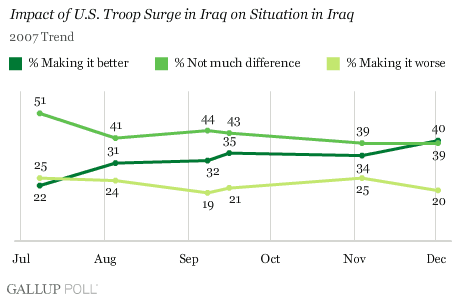
The acknowledgment from some Democrats, such as Rep. John Murtha, that "the surge is working" might be expected to have at least softened criticism of the surge among rank-and-file Democrats. Thus far, that is not apparent.
Currently, 18% of Democrats say the surge is making the situation in Iraq better, no different from the 19% saying this last month. Republican attitudes on the question have remained about the same. The upward movement in positive reviews has come mostly from political independents.
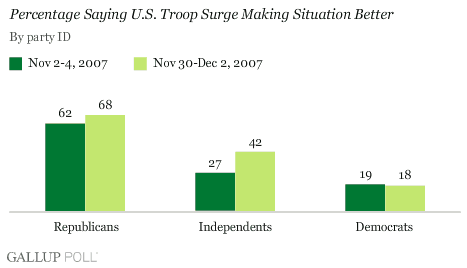
However, given that, on an ideological basis, almost all of the increase is seen among conservatives, it appears these are independents with a natural affinity toward Republicans.
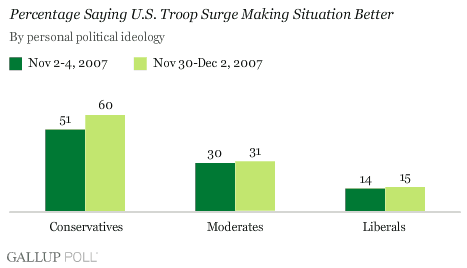
Gen. Petraeus' attempt at putting a positive spin on the U.S. troop surge in Iraq during his testimony before Congress in September was met with considerable skepticism by the Democrats and other critics of the administration. Since then, however, there has been significant reinforcement of his claim that the number of attacks on civilians and military personnel in Iraq is down, and the headlines on Iraq have become notably more upbeat.
Most likely as a result of this shift, Americans have grown a bit more likely than they were only two months ago to believe the United States will win the war in Iraq. Gallup gives respondents four options to choose from in describing their prediction for the war's outcome: 1) they think the United States will definitely win the war in Iraq; 2) they think the United States will probably win; 3) they think the United States can win, but don't think it will win; or 4) they do not think the United States can win the war in Iraq.
From March through September of this year, no more than a third of Americans were optimistic that the United States would definitely or probably win in Iraq, marking this period as the most negative about the war since Gallup established the measure in September 2005. As of the latest poll, public opinion has finally broken from this range, with a total of 39% of Americans saying the United States will win. However, this is still not as optimistic as was seen throughout 2005 and into 2006.
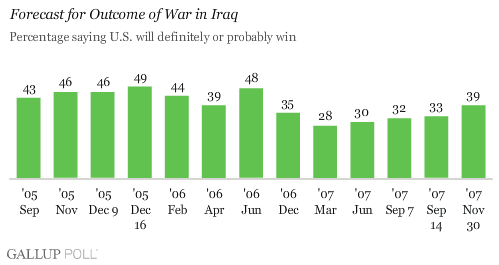
An additional 20% say the United States can win the Iraq war, but doubt it will happen, while 37% believe the United States cannot win. Most of the increased optimism over the past month appears in the percentage of Americans saying the United States will probably win the war, at 24%, up from 19%. There has been a corresponding five-point decline (from 42% to 37%) in the percentage of Americans saying the United States cannot win.
The fact that most Americans remain negative about U.S. prospects for success in Iraq is reinforced by another poll question asking Americans to say how well they think things are going for the United States in that country. Overall, only 43% perceive that things are going well, while a 56% majority says they are going badly.
This question was last asked in January 2006, so it is not a good indicator of how news of the surge has affected public opinion. But according to the long-term trend, current views are similar to views at several points long before the surge, and -- importantly -- a majority continues to say things are going badly.
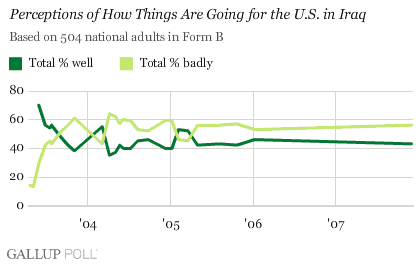
Buyer's Remorse Remains High
The slight rise in optimism about the war's progress has not shaken Americans' underlying opposition to U.S. military involvement in Iraq. Fifty-seven percent say it was a mistake to send U.S. troops to Iraq in the first place. This is essentially unchanged from the 58% recorded earlier this month, and is similar to the level of public opposition to the war seen for most of the past two years.
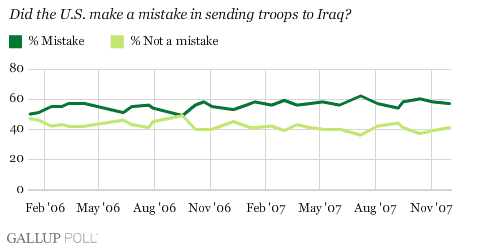
Survey Methods
Results are based on telephone interviews with 1,006 national adults, aged 18 and older, conducted Nov. 30-Dec. 2, 2007. For results based on the total sample of national adults, one can say with 95% confidence that the maximum margin of sampling error is ±3 percentage points.
For results based on the 502 national adults in the Form A half-sample and 504 national adults in the Form B half-sample, the maximum margins of sampling error are ±5 percentage points.
In addition to sampling error, question wording and practical difficulties in conducting surveys can introduce error or bias into the findings of public opinion polls.

